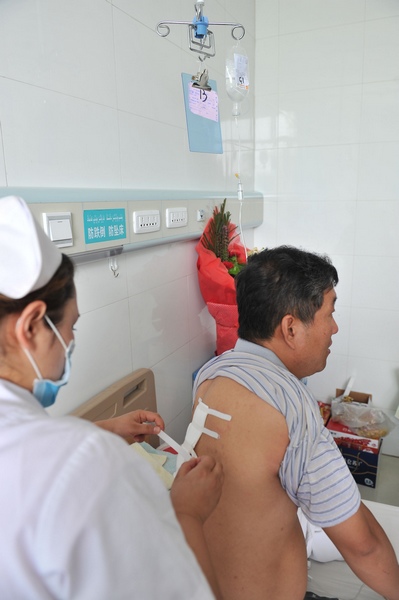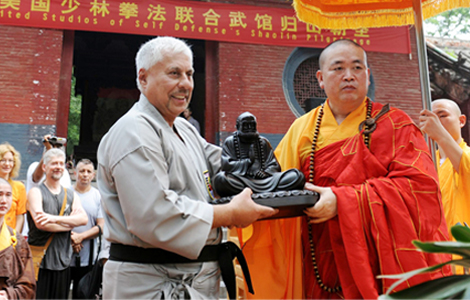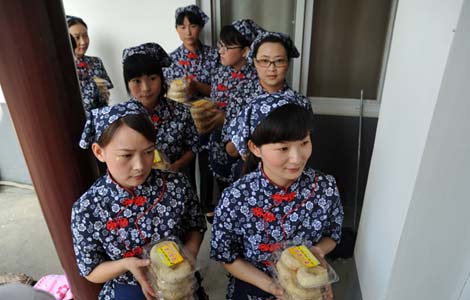Pain lingers after Xinjiang terrorist attack
Updated: 2013-07-05 08:30
By Cui Jia (China Daily)
|
||||||||
Religious extremism
The authorities said the spread of religious extremism is one of the factors contributing to the increasing number of attacks and have vowed to clamp down on it.
 |
|
A police officer receives medical treatment at the hospital in Shanshan. Provided to China Daily |
"Extremists are using religion as a cover to lure people into terror activities to achieve political goals. They misinterpret the Quran and fool people," said Abudurehep Tumniaz, head of the Xinjiang Islamic Institute and a well-respected religious leader, on Wednesday.
"The Quran clearly states that all people are as equal as the teeth of a comb and they all need to be respected, no matter which ethnic group they are from," he said. "Religious leaders around the region need to tell people the importance of the law and help them understand the spirit of Islam, which is based on peace and unity."
In Xinjiang, separatists love to recruit people in the name of religion and ethnicity because they are deceitful and find it easy to cover their true intentions, said Turgan Pida, director of the Xinjiang religious affairs bureau.
"More than 50 percent of Xinjiang's population is Muslim. By posing as religious people, separatists lure believers, especially young people, into their activities," he said.
In June, nine people received jail sentences for promoting ethnic hatred and discrimination on the Internet, and committing crimes prompted by religious extremism.
Development slowed
In addition to leaving people in fear and casting a shadow over their lives, attacks in Xinjiang have also affected the region's economic development. Every time attacks such as this occur, the speed of development will slow, added Turgan.
Yinruilin Hotel, which opened a year ago, was the first five-star hotel in Kashgar city. Following the attack in Selibuya, guest numbers have declined sharply, and on average only around 300 of the hotel's 1,531 rooms are occupied every day, according to the manager, Tang Dayu.
"Previous experience shows that business will gradually pick up after these attacks, but very slowly," he said. "Apart from these attacks, the city is actually very safe."
Wang, deputy commissioner of Kashgar said the number of tourists who visited the prefecture in June had fallen by more than 60 percent year-on-year because of the attacks.
In 2010, a special economic zone was established in the city, acting as a trade hub for Kashgar and neighboring countries, including Pakistan and Kazakhstan. A twin-tower building is being built in the zone to serve as a five-star hotel and provide duty free shopping.
"New investors to the city might be scared away by these isolated incidents because they don't know Xinjiang. The attacks will only affect society temporarily, but, as a special economic zone, Kashgar's potential is very promising," said Yuan Kaifang, head of the Shaanxi chamber of commerce in Kashgar, who has been running a business in the city since 1989.
"Some businessmen who left Xinjiang after the July 2009 riot told me they regretted their decision and have missed the best investment opportunities. Other businessmen have asked me if people still ride horses and camels to work in Kashgar," he said.

 Muscle Beach Independence Day
Muscle Beach Independence Day
 Tough workout for Li Na in war of words
Tough workout for Li Na in war of words
 Submersible taps mineral deposits in S China Sea
Submersible taps mineral deposits in S China Sea
 Ecuador finds spy mic for Assange meeting
Ecuador finds spy mic for Assange meeting
 US martial artists arrive at Shaolin Temple
US martial artists arrive at Shaolin Temple
 July 4 in Prescott: Balance of grief, patriotism
July 4 in Prescott: Balance of grief, patriotism
 Jubilant crowds celebrate after Mursi overthrown
Jubilant crowds celebrate after Mursi overthrown
 Growth slowing for services
Growth slowing for services
Most Viewed
Editor's Picks

|

|

|

|

|

|
Today's Top News
Figures show shifts in US, China economies
Egypt's prosecution imposes travel ban on Morsi
Russia more impatient over Snowden's stay
Mandela still 'critical but stable'
Figures show shifts in US, China economies
Chinese electrician killed in Cambodia
EU and US set for free trade talks
China and Canada to form pact
US Weekly

|

|






